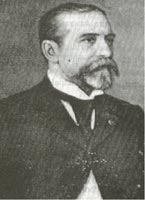
Barão Geraldo de Rezende
Encyclopedia

Aristocracy (class)
The aristocracy are people considered to be in the highest social class in a society which has or once had a political system of Aristocracy. Aristocrats possess hereditary titles granted by a monarch, which once granted them feudal or legal privileges, or deriving, as in Ancient Greece and India,...
of the Empire of Brazil, farmer
Farmer
A farmer is a person engaged in agriculture, who raises living organisms for food or raw materials, generally including livestock husbandry and growing crops, such as produce and grain...
and politician
Politician
A politician, political leader, or political figure is an individual who is involved in influencing public policy and decision making...
of the city of Campinas
Campinas
Campinas is a city and municipality located in the coastal interior of the state of São Paulo, Brazil. is the administrative center of the meso-region of the same name, with 3,783,597 inhabitants as of the 2010 Census, consisting of 49 cities....
, São Paulo
São Paulo (state)
São Paulo is a state in Brazil. It is the major industrial and economic powerhouse of the Brazilian economy. Named after Saint Paul, São Paulo has the largest population, industrial complex, and economic production in the country. It is the richest state in Brazil...
, Brazil
Brazil
Brazil , officially the Federative Republic of Brazil , is the largest country in South America. It is the world's fifth largest country, both by geographical area and by population with over 192 million people...
.
He was born in Rio de Janeiro
Rio de Janeiro
Rio de Janeiro , commonly referred to simply as Rio, is the capital city of the State of Rio de Janeiro, the second largest city of Brazil, and the third largest metropolitan area and agglomeration in South America, boasting approximately 6.3 million people within the city proper, making it the 6th...
, on 19 April 1847, a son to the aristocratic and military family of the Marquis and Marquess of Valença
Marquis of Valença
Marquis of Valença was a Portuguese title of nobility granted by royal decree of King Afonso V of Portugal, dated from October 11, 1451, to Dom Afonso of Braganza , who already was 4th Count of Ourém....
. He studied in Paris
Paris
Paris is the capital and largest city in France, situated on the river Seine, in northern France, at the heart of the Île-de-France region...
, France
France
The French Republic , The French Republic , The French Republic , (commonly known as France , is a unitary semi-presidential republic in Western Europe with several overseas territories and islands located on other continents and in the Indian, Pacific, and Atlantic oceans. Metropolitan France...
. His mother's family had acquired the Farm of Santa Genebra, in Campinas, and after her death, young Geraldo de Rezende decided to settle there in 1870. The farm was semi-ruined and worthless, but with characteristic vigor and entrepreneurship, he transformed and expanded it into one of the most productive farms of the region, with extensive sugarcane
Sugarcane
Sugarcane refers to any of six to 37 species of tall perennial grasses of the genus Saccharum . Native to the warm temperate to tropical regions of South Asia, they have stout, jointed, fibrous stalks that are rich in sugar, and measure two to six metres tall...
and coffee
Coffee
Coffee is a brewed beverage with a dark,init brooo acidic flavor prepared from the roasted seeds of the coffee plant, colloquially called coffee beans. The beans are found in coffee cherries, which grow on trees cultivated in over 70 countries, primarily in equatorial Latin America, Southeast Asia,...
plantations. The Baron was known for his modernity regarding the use of new methods and machinery in agriculture and was one of the founders of the Club da Lavoura in 1878, a club of wealthy and progressive farmers. In 1876 he married D. Maria Amélia Barbosa de Oliveira.
Inevitably, the Club became politically influential soon after, and many of its members involved themselves in local and state conservative
Conservatism
Conservatism is a political and social philosophy that promotes the maintenance of traditional institutions and supports, at the most, minimal and gradual change in society. Some conservatives seek to preserve things as they are, emphasizing stability and continuity, while others oppose modernism...
politics, so Barão Geraldo de Rezende was no exception. He was elected councilman from 1883 to 1886, president of the local chapter of the pro-monarchic Conservative Party, and state congressman by the 7th District of São Paulo in 1886. Like many of his colleagues he bitterly abandoned politics after the fall of the monarchy in 1889 and returned to his farm. Unfortunately, an economic crisis created many financial difficulties for the Baron, who had no other means of support, and he had to sell the Santa Genebra Farm, dying just before it, on October 1, 1907.
The region in and around part of the Santa Genebra Farm became a subdistrict of the city of Campinas, which was named in his honour (Barão Geraldo
Barão Geraldo
thumb|right|300px|Panoramic view of Barão Geraldo, taken from a hill overlooking [[UNICAMP]]Barão Geraldo is a district of the municipality of Campinas, in the state of São Paulo, Brazil...
), and where the large campus of the State University of Campinas is now located.

